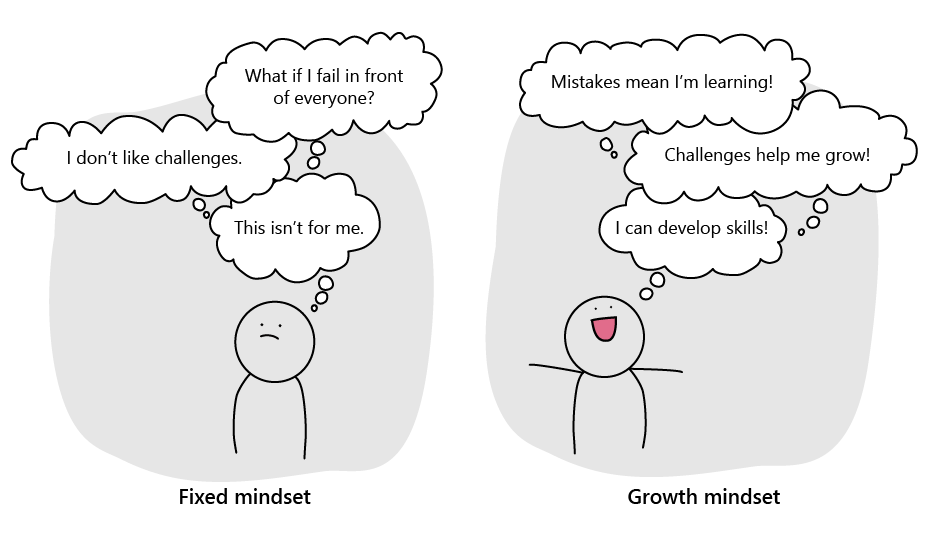Differentiate between fixed and growth mindsets
You're becoming more aware of your mindset. Your colleague was correct when they told you your fixed mindset is negatively affecting your ability to work on your coding project. Recognizing whether your internal dialogue suggests a fixed or growth mindset is the first step to change your fixed mindset to a growth mindset.
Reflect on your inner dialogue
Becoming aware of your own internal dialogue can help you determine your mindset. Use the following questions to reflect on your inner dialogue. Optionally, note your responses on a device or on paper.
Think about a time when you said no to a task or project and then later wished you had said yes.
What inner dialogue did you have that made you decline the opportunity, task, or project?
If you had to do it over again, how would you change your inner dialogue?
Did you have a limiting belief about yourself and your capabilities that affected your decision? Do you still think that belief is true?
Think about a moment when you resisted starting a task or project because of your internal dialogue.
How did your inner dialogue stop or delay you from starting?
Did you eventually begin or complete the task or project? If so, did changing your internal dialogue help you start?
Examine fixed and growth mindset statements
Inner dialogue indicates what your mindset is in a given situation. Examine the following table, which lists examples of fixed mindset statements and their alternative growth mindset statements.
| Fixed mindset statement | Alternative growth mindset statement |
|---|---|
| If I mess up, I'm not meant to do this. | Mistakes mean I'm learning. |
| I don't have the skills. | I can develop the skills. |
| I should quit because I don't know what I'm doing. | I'll keep going. I don't know what I'm doing now, but eventually I will. |
| Failure is the limit of my abilities. | Failure is an opportunity to grow. |
| I'm either good at it or I'm not. | I can learn to do anything I want. |
| I don't like to be challenged. | Challenges help me to grow. |
| My potential is predetermined. | My effort and attitude determine my abilities. |
| When I'm frustrated, I give up. | When I'm frustrated, I ask for help from others. |
| Feedback and criticism are personal. | Feedback is constructive. |
| I stick to what I know. | I like to try new things. |
| My ideal colleagues recognize that I'm smart and admire me. | My ideal colleagues recognize my faults and help me improve. |
| Other people's successes mean that I've failed. | I'm inspired by the success of others. |
| Success is about establishing superiority. | Personal success is when I work my hardest to become my best. |
| Imperfections and setbacks are shameful and a label. | Imperfections are human and motivating. |
| I listen to feedback on my current abilities and tune out feedback that might help me grow. | I'm keenly attentive to information that can help me expand my knowledge and skills. |
